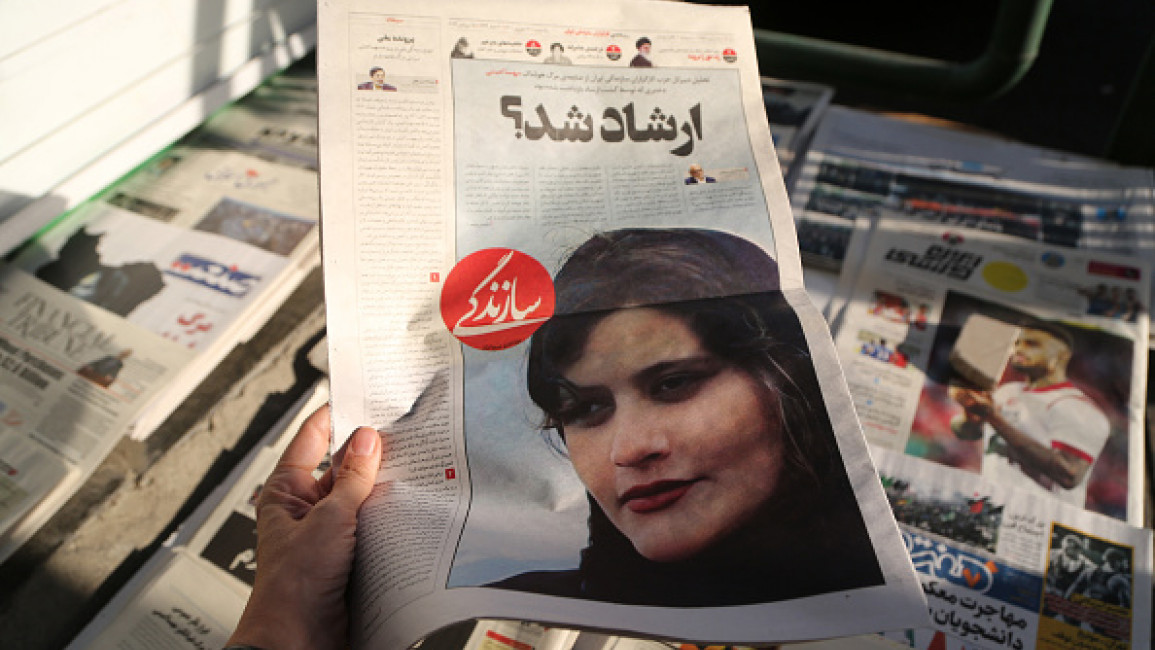General strike launched in Iran's Kurdistan to protest killing of Mahsa Amini by 'morality police'
Iranian Kurds have launched a general strike against the tragic death of Mahsa (Zhina) Amini, a Kurdish woman from Saqqez who died three days after being beaten severely by Iran's morality police for not wearing "a proper hijab".
Amini, 22, was on a visit with her brother to the Iranian capital city of Tehran when she was detained on Tuesday. She died on Friday after being hospitalised after being beaten by the police unit responsible for enforcing Iran's strict dress code for women, which includes the compulsory wearing of the headscarf in public.
On Saturday afternoon, after her funeral, women in Amini's hometown of Saqqez took off their own headscarves in protest against police brutality. Public protests continued on Sunday.
Kurds in several cities across Iran's Kurdistan have staged a general strike on Monday in protest of the death of Mahsa Amini.
Iranian health authorities claimed that Amini had suffered from epilepsy, but her father denied the claim, stressing that his daughter suffered physical trauma to her head.
"It is not clear how she was beaten. The women who were in the ambulance said that she was hit on the head," Amjad Amini, Mahsa’s father, told Rudaw on Monday.
He added that Iranian authorities have so far refused to give him the autopsy report for his daughter's death.
"During Saturday's protests in Saqqez against the killing of Amini, 33 people were wounded due to Iran's police crackdown, five people were in critical conditions who were later transferred to hospitals in Tabriz. Fourteen other people were injured in Sanandaj province. But no people were killed," the head of the Hengaw Organization for Human Rights, Arsalan Yarahmedi, told The New Arab.
"According to our information, so far 20 people are arrested by Iranian security in Saqqez, and more than 10 people were arrested in Sanandaj. People in the Kurdish cities of Saqqiz, Sanandaj, Mariwan, Baneh, Divandarreh, Shno, Mahabad, Bokan, Urmiya and Sardasht went on a general strike by closing shops and markets as a symbol of protest against Iranian authorities," he added.
The Coordination Centre of Iranian Kurdistan's Parties in a statement on Friday, a copy of which was sent to TNA, called for the strike.
"We call on all people of Kurdistan to express their protest against the inhumane policies of the [Iranian] regime and for protecting the dignity of Kurdish girls and women, as well as the sons of the Kurdish people, to shut down their shops and markets on Monday making it a general strike," read an excerpt of the statement.
#BREAKING Videos obtained by @IranIntl show heavy clashes between Iranian protesters and security forces in the city of Divandarreh in Kurdistan province. @HengawO says at least 10 people have been injured, one critically.#IranProtests #Mahsa_Amini pic.twitter.com/yTsuK7idVj
— Iran International English (@IranIntl_En) September 19, 2022
"One Kurdish activist was martyred when the Islamic regime cracked down on protestors at the funeral of Amini on Saturday. According to statistics from hospitals in Saqqez, more than 20 activists were injured," Khalid Wanawsha, a central committee member of the Kurdistan Democratic Party of Iran (KDPI), told TNA.
"The general strike across the Kurdish cities is a crucial and big rejection by the Kurdish people of Iranian Kurdistan against the Islamic regime’s oppression policies, we applaud our people," he added.
Women in Iranian Kurdistan are often heavily targeted by Tehran's repressive policies. On 3 September, Shler Rasuli, a Kurdish woman from Mariwan city, jumped from the window of the building of a neighbouring house after a man tried to rape her.
A week later, she died in hospital.
The Coordination Centre of Iranian Kurdistan's Parties described the culprit as being a "mercenary of the Islamic regime".
Mehsa Amini, a 22-year-old Iranian woman, was brutally murdered by the moral police because of the mandatory hijab #mahsa_amini #مهسا_امینی 🖤 pic.twitter.com/4mXoSIB8rF
— Kzhal (@lilkzhl) September 19, 2022
"A woman dying after being arrested because of how she was dressed is evidence of outrageous depravity. Conducting a transparent investigation, holding those responsible for Mahsa's death appropriately accountable and providing reparations to her family is absolutely necessary," Tara Sepehri Far, Iran researcher at the Human Rights Watch wrote.
"But the Iranian authorities should also promptly abolish the compulsory hijab law and remove or reform other laws that deprive women of their autonomy and rights," she added.



